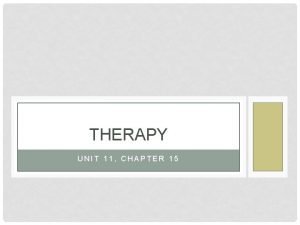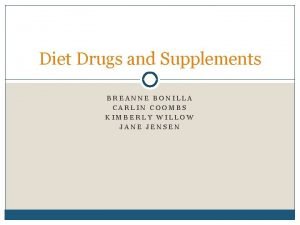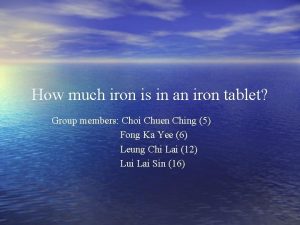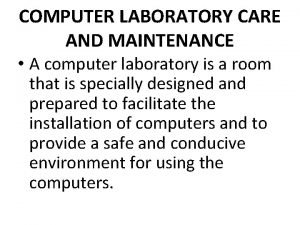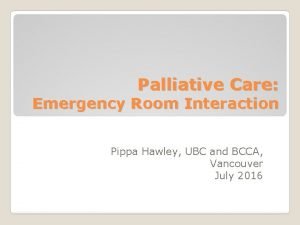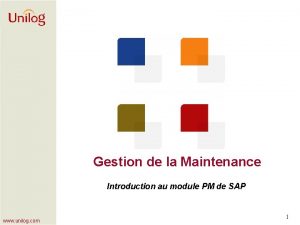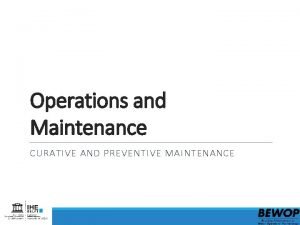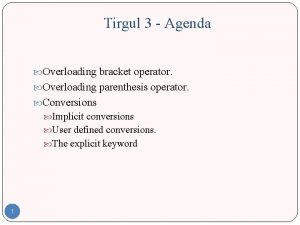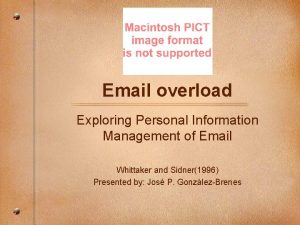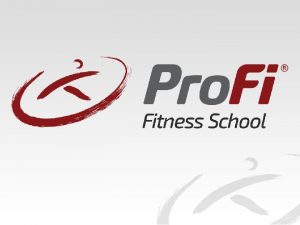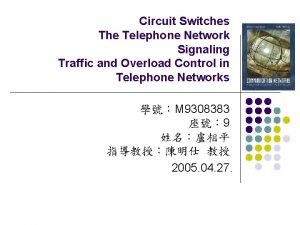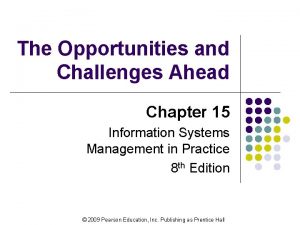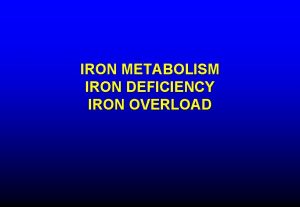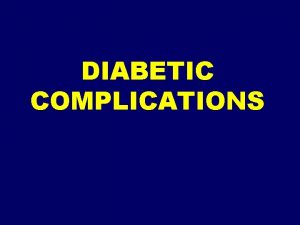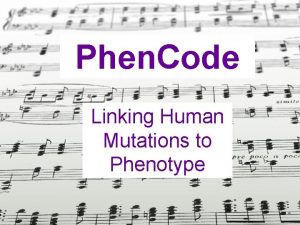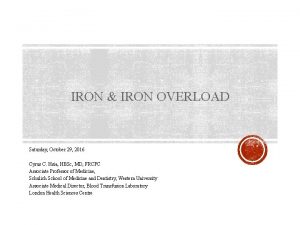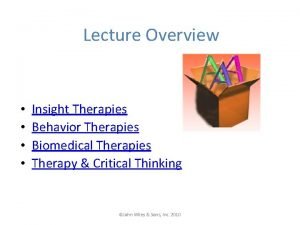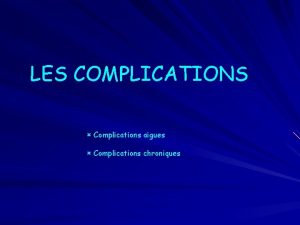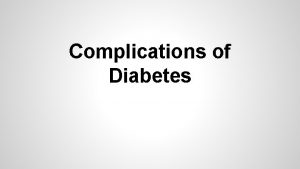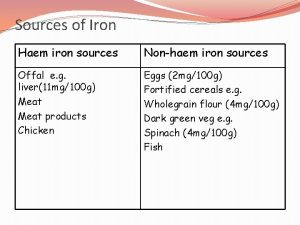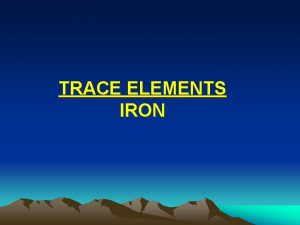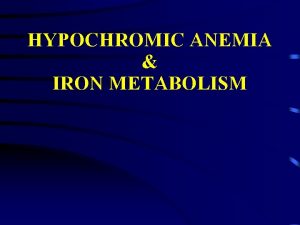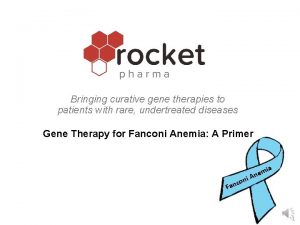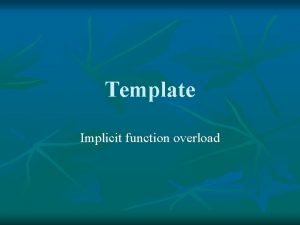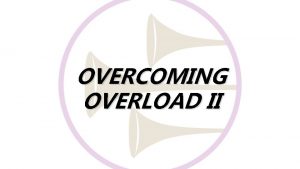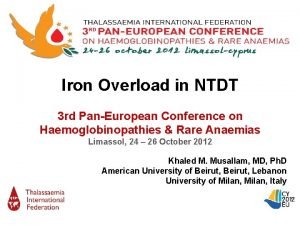Phen X Curative Therapies WG Complications Iron overload

















- Slides: 17

Phen. X Curative Therapies WG Complications: Iron overload Stella Chou, MD January 15, 2021

Pre-transfusion evaluation ● Definition: laboratory studies required (ABO/Rh. D type, antibody screen) and recommended (extended red cell antigen profile) prior to transfusion ● Rationale: degree of antigen matching is an important consideration of therapy outcome ● Considerations o ABO/Rh. D matched red cells lacking antigens for which patient has already been alloimmunized to is the minimum level of matching required o Rh (C, E or C/c, E/e) and K matching is recommended for patients with SCD 1, 2 o Additional antigen matching for other blood group systems is occasionally implemented 2

Existing measurement protocols in Phen. X Toolkit? ● No, there are no blood bank assays in Phen. X Toolkit 3

Recommendations to the WG: Pre-transfusion evaluation ●Recommendation to add 4 measurement protocols o Antibody Screen o Determines presence or absence of red cell antibody o Antibody Identification o Determines antigen specificity of red cell antibody o Involves testing patient plasma against a panel of donor red cells with known antigen phenotypes o Direct antiglobulin test o Determines whether red blood cells are coated with immunoglobulin, complement, or both o Aka direct Coombs test 4

Recommendations to the WG: Pre-transfusion evaluation ●Recommendation to add 4 measurement protocols, continued o Red cell antigen profile, include o Obtained via serologic vs genotype method o Antigen phenotype: (positive or negative) o o 5 Rh (D, C, c, E, e), K/k Jka/Jkb, Fya/Fyb, M/N, S/s Additional red cell antigens 1 RH variants (presence/absence of partial, weak antigens)2, 3

Transfusion history ● Definition: laboratory studies required (ABO/Rh. D type, antibody screen) and recommended (extended red cell antigen profile) prior to transfusion ● Rationale: degree of antigen matching, transfusion burden, and alloimmunization are important consideration of therapy outcome ● Considerations o ABO/Rh. D matched red cells lacking antigens for which patient has already been alloimmunized to is the minimum level of matching required o Rh (C, E or C/c, E/e) and K matching is recommended for patients with SCD 1, 2 6

Existing measurement protocols in Phen. X Toolkit? ● Yes, one covering aspects of transfusion history ●Protocol – History of transfusion ● Includes three self-administered questions from Duke-UNC-Emory Outcome Modifying Genes Study ● Estimate the number of units (pints) of blood that you have ever received (none, 1 -10, … >50) ● Are you on chronic transfusion therapy at this time? (yes/no, don’t know) ● Are you on iron chelation treatment? (yes/no, don’t know) 7

Description of measurement protocols in the Phen. X Toolkit ● Coverage of Curative Therapies Research/Scope Element? o Insufficient for transfusion history in SCD ● Pros/Cons of the measurement protocols in the Toolkit o Pros: self-administered o Cons: alloimmunization history lacking, degree of antigen matching lacking, frequency choices may only be relevant to episodically transfused ● Can the measurement protocol be annotated for use in SCD Curative Therapies? o No, need a tool meant for providers to annotate rather than self-administered 8

Recommendations to the WG: transfusion history ●Recommendation to add measurement protocols o Chronic transfusion, currently or in past (Y/N) o Number of donor exposures (exact number or none, 1 -10, 11 -50, over 200, over 1000) o Red cell antigen matching for units transfused: o ABO/Rh. D only o Prophylactic Rh (C, E or C/c, E/e), and K matching o Prophylactic or Responsive extended matched (Jka/Jkb, Fya/Fyb, S/s) o Specific antigen matching 9

Recommendations to the WG: transfusion history ●Recommendation to add measurement protocols, continued o Red cell alloimmunization o (Y/N) o Antibodies identified o Delayed hemolytic transfusion reaction o Number of DHTR events o With antibody specificity identified (Y/N) o Treated with: 1 o o 10 Steroids IVIg Rituximab Eculizumab

Transfusion complications: alloimmunization ● Definition: antibodies formed against foreign red blood cell antigens ● Rationale: patients with SCD have the highest prevalence of alloimmunization among transfused patient populations, and may lead to poor outcomes following transfusion ● Considerations o The degree of prophylactic antigen matching is a key factor o Rh (C, E or C/c, E/e) and K matching is recommended for patients with SCD 1, 2 11

Existing measurement protocols in Phen. X Toolkit? ● No, there are no measurement protocols in Phen. X Toolkit pertaining to red cell alloimmunization 12

Recommendations to the WG: alloimmunization ●Recommendation to add measurement protocol o Antigens alloimmunized against o Consider listing antigens o If Rh antibody, was patient on Rh-matched transfusion protocol o D, C, E or D, C, c, E, e o Was there an associated delayed hemolytic transfusion reaction at time of antibody identification? o Defined by 13

Recommendations to the WG: alloimmunization ●Recommendation to add measurement protocol, continued o Was there an associated delayed hemolytic transfusion reaction at time of antibody identification? o Defined as a significant drop in hemoglobin within 21 days posttransfusion associated with 1 or more of the following: new red cell alloantibody, hemoglobinuria, accelerated increase in Hb. S% with concomitant fall in Hb. A%, relative reticulocytosis or reticulocytopenia from baseline, significant lactate dehydrogenase rise from baseline, and exclusion of an alternative cause 1 14

Transfusion complications: transfusion reactions ●Definitions: An allergic transfusion reaction can be associated with fever, chills, pruritis or hives. In severe reactions, respiratory distress or hypotension can occur. A febrile transfusion reaction typically involves fever, +/- chills. ●Rationale: transfusion reactions are relatively common ●Considerations: multiple allergic transfusion reactions may lead to a requirement for washed or saline suspended red cell products 15

Existing measurement protocols in Phen. X Toolkit? ● No, there are no measurement protocols in Phen. X Toolkit pertaining to allergic or febrile transfusion reactions ●Protocols do exist for ● Body temperature – tympanic thermometers ● Normal range defined as 96. 1 to 99. 3 Farenheit or 35. 637. 4 Celcius 1 ● Body temperature – oral thermometers ● Normal range defined as 96. 8 to 99. 7 Farenheit or 36. 037. 6 Celcius 1 16

Recommendations to the WG: transfusion reactions ●Recommendation to add measurement protocol o Allergic transfusion reaction (Y/N, don't know) o Consider listing symptoms experienced o If had allergic transfusion reaction o Was treatment required? (Y/N, don’t know) o Benadryl, steroids, epinephrine? (Y/N, don’t know) o Pre-medication required for future transfusions (Y/N, don’t know) 17
 Therapies defined as “talk therapies” include
Therapies defined as “talk therapies” include Breanne bonilla
Breanne bonilla Iron sharpens iron friendship
Iron sharpens iron friendship Mass of iron in an iron tablet
Mass of iron in an iron tablet Curative swag
Curative swag Curative maintenance definition
Curative maintenance definition Curative care
Curative care Poste technique sap
Poste technique sap Maintenance curative
Maintenance curative Curative tourism
Curative tourism Changing trends in hospital care
Changing trends in hospital care School health additional referral program
School health additional referral program C++ operator bracket
C++ operator bracket Information overload
Information overload Progressive overload
Progressive overload Environmental psychology
Environmental psychology Spc switching system overload control
Spc switching system overload control Information overload
Information overload
